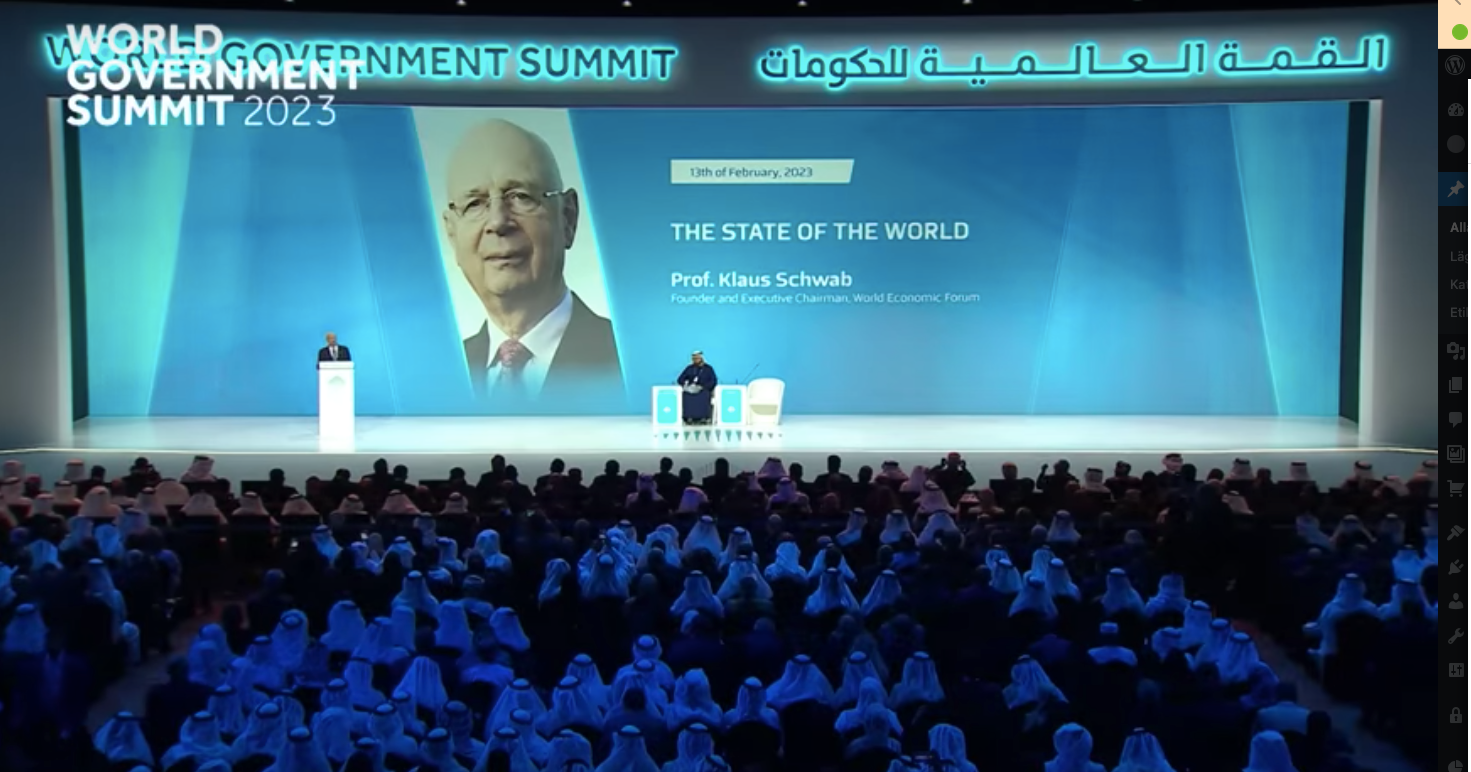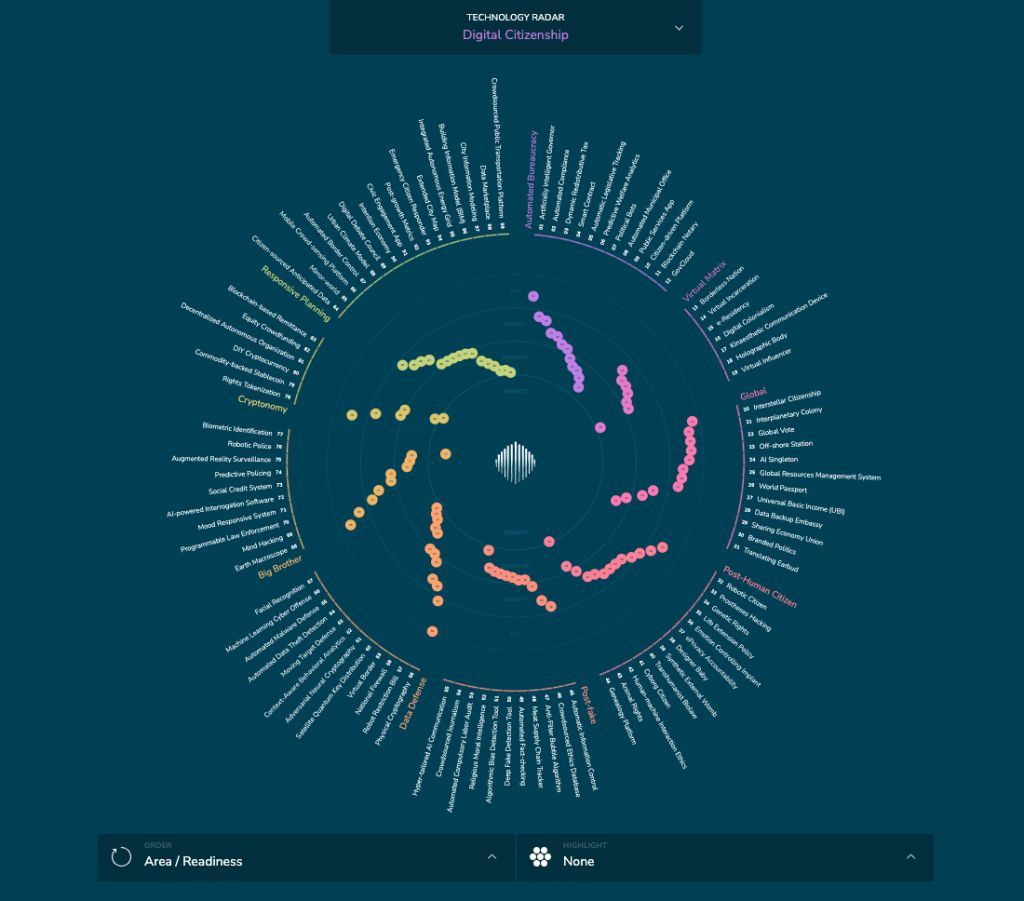During the World Government Summit 2023, which was held in Dubai in the United Arab Emirates on February 13-15, the chairman of the World Economic Forum, Klaus Schwab, proclaimed that whoever controls the technologies of the fourth industrial revolution will be the master of the world.
Schwab was introduced by the chairman of the meeting, Mohammed bin Abdullah Al Gergawi. It was obvious who was higher in rank. Even in the recently released commemorative film for the tenth anniversary of the World Government Summit, Schwab is the opening speaker.[1]
World Government Summit was founded in 2013 as ”Government Summit” by the absolute monarch of Dubai, Mohammed bin Rashid al Maktoum (he is also the Prime Minister of the United Arab Emirates). According to Schwab, the meeting was functioning like a “little brother” to the World Economic Forum annual meeting i Davos. In 2016, the Government Summit was upgraded to become an organisation, and the name changed to the “World Government Summit” to reflect its ambitions to play a greater role on the international arena and strengthen its cooperation with global institutions and organisations such as the UN, WEF and the World Bank.[2] To underline this, the SDGs in Action initiative was started in the same year.[3]
The purpose of the forum is to form a knowledge platform at the “intersection between government, futurism, technology and innovation.” Besides Gergawi, the leadership consists of the two UAE ministers Ohood Bint Khalfan Al Roumi and Omar Sultan Al Olama. All three are closely associated with the World Economic Forum. Gergawi is a member of the WEF Leadership Council while Ohood and Omar are Young Global Leaders (class of 2012 and 2022, respectively).
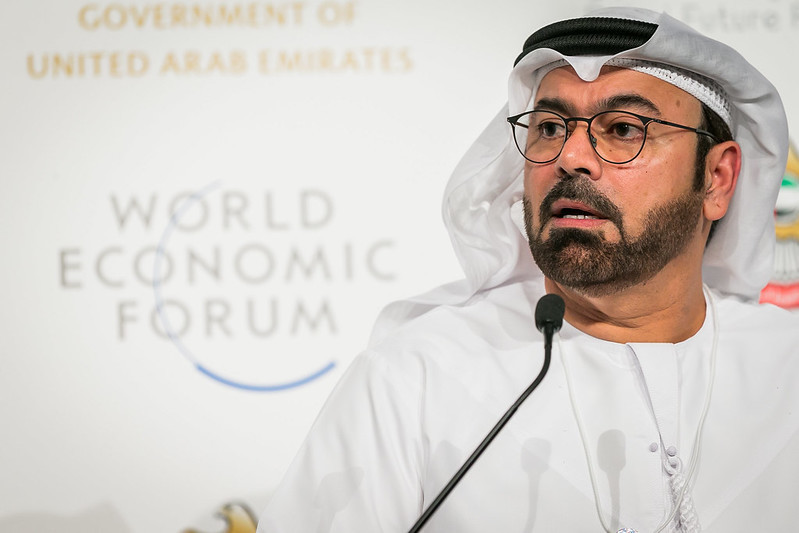
World Economic Forum is both a co-founder and a close strategic partner. Today, the World Government Summit is very much their branch in the Middle East, while the Sultanate of Dubai in turn serves as a laboratory where the futuristic concepts and technologies that Schwab propagates in his books can be tested. It is a futuristic model country and constitutes the futurists’ own Mecca. This year, for example, the United Arab Emirates announced its intention to launch a digital central bank currency.[4] The country also created a space program in 2006 which led to a space probe being sent to the planet Mars in 2021.
But the United Nations has also participated as a strategic partner since the beginning. Since then, a number of subsidiary bodies such as UNESCO, UNICEF, ILO and WHO have joined.
This also shows that the WEF and the UN have been working closely for several years before their partnership became official in June 2019.
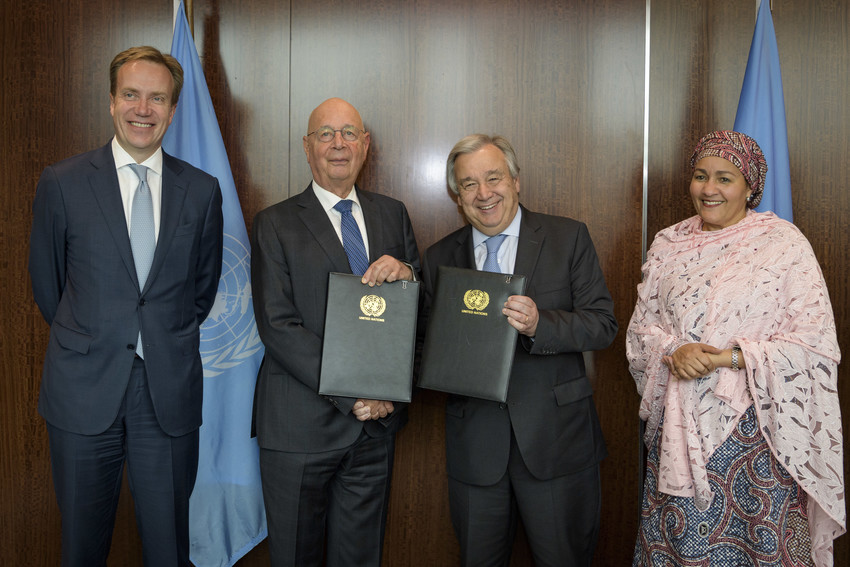
The UN also has a close relationship with the United Arab Emirates (through a strategic partnership) since the country gained independence from the United Kingdom over 50 years ago. The country is today the UN’s logistics hub in the Middle East and a large number of UN agencies are represented in the country.
This year, the UN climate meeting COP28 will also be arranged in Dubai.[5] Given that the country houses the world’s sixth largest oil reserves and seventeenth largest natural gas reserves, it will undeniably be a bit difficult to take their concern for the climate seriously. The entire country’s wealth and the futuristic metropolis of Dubai have been built with the help of the gigantic oil revenues. Rather, their commitment is about the technological transformation that the “climate crisis” motivates.
The United Arab Emirates is an autocratic monarchy without popular representation and has committed numerous human rights violations. The fact that Klaus Schwab sees no problems with the close collaboration is perhaps understandable. No opposition is allowed that can say no to the futuristic surveillance agenda. But the fact that the supposedly humanitarian UN is in close partnership with authoritarian and powerful leaders is all the more difficult to digest. But on the other hand, all of the world’s approximately 30 dictatorships are members of the UN.
In addition to Klaus Schwab, this year’s meeting was attended by a number of the faithful squires of the agenda such as World Trade Organization head Ngozi Iweala, IMF head Kristalina Georgieva, WHO head Tedros Ghebreyesus (Tedros was already there in 2018 and talked about creating “a world without pandemics”!!)[6], Henrietta Fore (UNICEF), Nick Clegg (Meta), and contradictory futurist Elon Musk (SpaceX, Neuralink och Starlink).
The summit also gathers a number of member companies with close ties to World Economic Forum like Google, Meta, Amazon, Visa, PWC, McKinsey, Boston Consulting Group and Accenture.
In his “State of the World address” [!], Klaus Schwab declared that we are at the beginning of an extensive technological transformation that will change everything in the coming decades.
Artificial Intelligence, but not only Artificial Intelligence, but also the Metaverse, new space technologies, and I could go on and on. Synthetic Biology. Our life in ten years from now will be completely different…
According to Klaus, it is important to take the lead in this development in order to ultimately stand as “the ruler of the world”.
…and who masters those technologies, in some way, will be the master of the world.
In order to emerge as a winner in the end, developing the necessary leadership skills is crucial.
What Klaus is referring to is that it is the compliant, adaptable, and resilient who will do best. That is to say, those who enter the futuristic path and the idea of the sustainable utopia that Klaus and the WEF represent. He also said that it is important to be prepared for unpleasant surprises!
Because there will be certainly what we call the black swans. The unpleasant surprises which will come in our way.
(A “black swan” is “an unlikely and unpredictable event that could potentially have serious consequences”.)
According to Klaus, the current global crises that have created a fragmented world should not really be seen as crises because they are in fact an expression of “deep systemic transformation processes”. Klaus also predicts that the upheaval processes we have seen in recent years will escalate. This largely follows the scenarios outlined by Rockefeller Foundation’s Scenarios for the Future of Technology and Development and in the UN-backed Great Transition Initiative. It’s lead author, the futurist Paul Raskin, wrote in Journey to Earthland: The Great Transition to Planetary Civilisation (2016):
…various triggers could induce a general, system-wide crisis. To wit, abrupt climate change could generate food shortages, economic instability, mass migration, and conflict. A pandemic, spread by the mobile affluent and uprooted poor, could ripple far and wide, overwhelming healthcare institutions. The mayhem induced by a macro-terrorist attack could segue into a degenerative cycle of violence and disorder. Absolute shortage of vital resources, such as water, oil, and arable land, could generate a tsunami of chaos. A collapse of the global financial system could ignite a cascade of knock-on disruption.[7]
It is not a question of returning to the world as it existed before the crises hit. What is happening is that the old world is being smashed to pieces so that the new and “better” order can rise like a Phoenix. Schwab talks about “we” having to re-globalise the world. But this time with a new management that can effectively “sanitise carbon dioxide” and lead the world to zero emissions by 2050. Back to Raskin’s scenarios for the future:
The Planetary Phase, born of systemic crisis, urges a systemic response.
A Revitalised UN
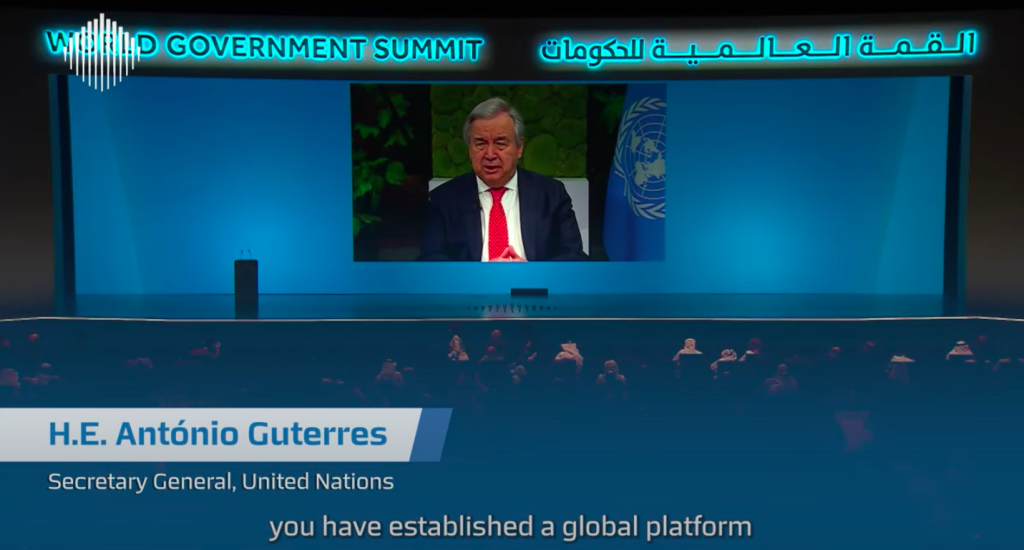
This is where the United Nations enters the stage as a saviour. During the summit, UN Secretary-General António Guterres, in a speech from UN headquarters, said the World Government Summit has established a global platform that will help shape the governments of the future. Guterres spoke of the need to strengthen global governance to deal with the “climate disaster” as well as to meet the global sustainability goals:
We need everyone – across the private sector, civil society, and beyond – to work together for the common good. This is our common agenda.
Guterres believes he has the answer to the systemic crisis hitting the world after the pandemic and the war in Ukraine. The UN’s Our Common Agenda, which was introduced in 2021 and is expected to be adopted at the Summit of the Future, in September 2024 will offer a whole new set of tools for effectively managing world crises (and world population). More specifically, the planned Emergency Platform is intended to gather select representatives of the global community (UN bodies, corporations, and civil society) to address “emergencies” such as “climate crises”, “pandemics”, “black swan events” and ”major events in space” (read more about this in my article Emergency Platform).
This could have far-reaching consequences and echoes the authoritarian Fortress World scenario in Great Transition, where “an upgraded UN” is used as a coordinating platform to implement draconian measures using Big Data and surveillance technology in order to protect the interests and resources of the “new power elite”.
The World Government Summit provides a forum where all these ideas are given traction. They intend not only to try and predict future development, but also to help steer it in a desired direction. As Klaus Schwab said during The Great Narrative Meeting in Dubai in November 2021:
In order to shape the future. You have first to imagine the future. You have to design the future. And then you have to execute.[8]
Through the WGS interactive tool “Technology Radar” you can also get an insight into the future that the futurists desire and how far technological development has come in a number of different areas. More than 150 emerging technologies are identified here, mapped out, each positioned to indicate its stage of maturity. [9] The wheel reads like a map over every dystopian science fiction concept ever envisioned and has subheadings like Big Brother, Virtual Matrix and Post-Human Citizen. But this time, not to warn us about them but rather to celebrate the fact that they are finally available, or expected to be in the near future.
Here, we find descriptions of how a social credit system might work:
This technological development could either help citizens achieve optimal citizenship scores or lead to ostracism and, ultimately, exile.
Different surveillance systems could immediately flag citizens with low scores, following them more closely than citizens with high scores. Any misbehavior, no matter the severity, would be noted and immediately punished with the help of robot police audits.
Dubai Future Forum
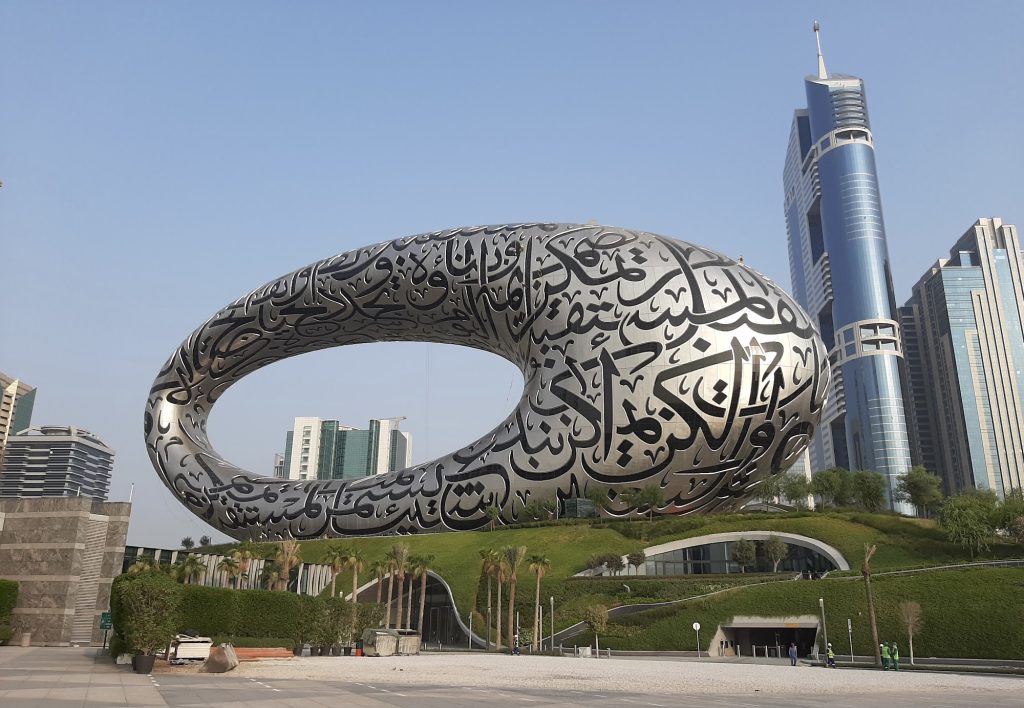
In October 2022, the Dubai Future Forum conference was organised for the first time in the Museum of the Future. Behind the initiative is the Dubai Future Foundation, which is led by Crown Prince Sheikh Hamdan bin Mohammed bin Rashid Al Maktoum (YGL 2008) and which also includes the leading Troika from the World Government Summit. In cooperation with World Economic Forum, the Dubai Future Foundation is also managing the local Center for the Fourth Industrial Revolution in United Arab Emirates .[10]
The meeting gathered 45 international institutions and 400 experts with the aim of “designing the future”. Here, themes such as “the Future of our World”, “Mitigating Existential Risk through Foresight”, and the possibilities for human civilisation to become an “interplanetary civilisation” were discussed.[11] The agenda was clearly interwoven with the UN’s future agenda (To Think and act for Future Generations) through the participation of both UN Global Pulse and UN Future Forum. Among the speakers were Swedish transhumanist Anders Sandberg from the Future of Humanity Institute and Jerome Glenn from The Millennium Project.
During the meeting, the Global Future Society was also founded. An alliance of futurists set up to make the Museum of the Future in Dubai a home for the world’s futurists and visionaries.[12] This is like the modern equivalent of the Holy Roman Emperor Rudolph II’s quest to gather all the leading alchemists in Prague in the 16th century. The Futurists are the 21st century alchemists.
In a conversation between Al Gergawi and fellow futurist Dr. Michio Kaku discussed the enormous technological changes expected in the next 50 years. Just like Schwab, Kaku envisions a transhumanist future that changes the very definition of what it means to be human. A total fusion between man and machine.
Computers will disappear and will be replaced by chips embedded in our brains. We will communicate telepathically – and we will be able to record our memories and emotions. Television will disappear, too, and the internet will be neurologically wired. We’ll be using quantum computers faster and more powerful than anything we’ve seen before.[13]
Kaku also believes that the digitisation of the brain will lead to us becoming immortal.
For futurists, there seems to be no doubt whatsoever. They dream of making a digital ascension to become superhumans in the new millennium. Wanting to preserve our humanity and society as it is and foregoeing the offer to be “upgraded” with implants is classified as backward-looking and “bioconservative”. As Klaus Schwab stated in his speech:
You can not catch up with the new technologies. You have to be a front runner. Because otherwise you will be on the losing side.
We seem to have been taken over by an extreme and bizarre techno cult. The question is how can we save ourselves from these unrealistic utopians with delusions of grandeur and create a future that truly benefits our humanity? Maybe it’s time for a “Major Outer Space Event” where this futurist cult is sent on a one-way trip to Mars? Elon Musk has declared his intention to take off with SpaceX in 2029. The question is, can we afford to wait that long?
Jacob Nordangård, Ph.D. Technology and Social Change
© Stiftelsen Pharos. May not be reproduced without permission (contact)
Newly updated list of all Young Global Leaders can be downloaded in several formats: WEF YGL list
Read more about the background and context, including World Economic Forum, Agenda 2030, and the Fourth Industrial Revolution, in Rockefeller – Controlling the Game (order from Pharos Webshop). Also available in Polish from sklep.samoswiadomi.pl/
[1] World Government Summit | 10 Years, www.youtube.com/watch?v=2MsFP8DuWZg
[2] World Government Summit (2016), World Government Summit 2016, www.worldgovernmentsummit.org/docs/default-source/publication/2016/coffee-table-books_english-ebook292f7ac4e97c6578b2f8ff0000a7ddb6.pdf?sfvrsn=17531f0a_2
[3] World Government Summit (2023), SDGs in Action, sdg.worldgovernmentsummit.org/
[4] Cointelegraph (2023), UAE central bank to issue CBDC as part of its financial transformation program, cointelegraph.com/news/uae-central-bank-to-issue-cbdc-as-part-of-its-financial-transformation-program
[5] COP28 UAE, www.cop28.com/en/
[6] Can We Create A Pandemic Free World? Dr. Tedros Ghebreyesus – WGS 2018, www.youtube.com/watch?v=3SbRgYF1ONo
[7] Raskin Paul (2016), Journey to Earthland – The Great Transition to Planetary Civilisation, Tellus Institute, greattransition.org/images/GTI_publications/Journey-to-Earthland.pdf
[8] WEF (2021), A Call for the Great Narrative, www.weforum.org/events/the-great-narrative-2021/sessions/a-call-for-the-great-narrative
[9] WGS (2023), Technology Radar, Digital Citizenship, radar.envisioning.io/wgs-citizenship/?c=tech_SZmGFBRuoPzt8onJw
[10] UAE Center for the Fourth Industrial Revolution (2023), c4ir.ae/
[11] Dubai Future Foundation (2022), Agenda, www.dubaifuture.ae/dubaifutureforum/agenda
[12] Dubai Future Foundation (2022), Dubai Future Forum Concludes, Setting Pathway for a Promising Future, www.dubaifuture.ae/latest-news/dubai-future-forum-concludes-setting-pathway-for-a-promising-future/
[13] Dubai Future Foundation (2022), Dubai can become global testbed for the future,
www.dubaifuture.ae/latest-news/dubai-can-become-global-testbed-for-the-future-says-mohammad-al-gergawi/
